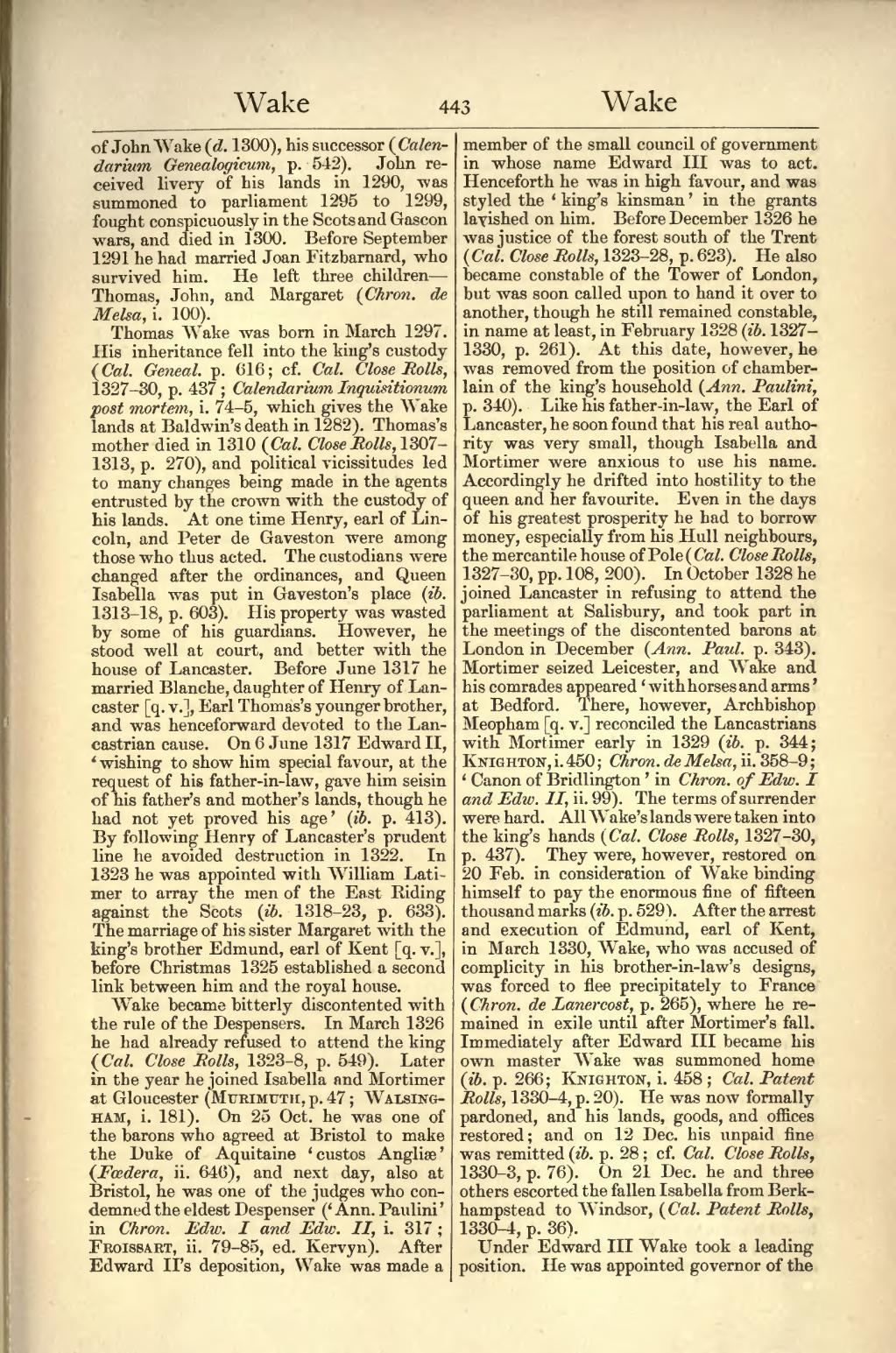of John Wake (d. 1300), his successor (Calendarium Genealogicum, p. 542). John received livery of his lands in 1290, was summoned to parliament 1295 to 1299, fought conspicuously in the Scots and Gascon wars, and died in 1300. Before September 1291 he had married Joan Fitzbarnard, who survived him. He left three children—Thomas, John, and Margaret (Chron. de Melsa, i. 100).
Thomas Wake was born in March 1297. His inheritance fell into the king's custody (Cal. Geneal. p. 616; cf. Cal. Close Rolls, 1327–30, p. 437; Calendarium Inquisitionum post mortem, i. 74–5, which gives the Wake lands at Baldwin's death in 1282). Thomas's mother died in 1310 (Cal. Close Rolls, 1307–1313, p. 270), and political vicissitudes led to many changes being made in the agents entrusted by the crown with the custody of his lands. At one time Henry, earl of Lincoln, and Peter de Gaveston were among those who thus acted. The custodians were changed after the ordinances, and Queen Isabella was put in Gaveston's place (ib. 1313–18, p. 603). His property was wasted by some of his guardians. However, he stood well at court, and better with the house of Lancaster. Before June 1317 he married Blanche, daughter of Henry of Lancaster [q. v.], Earl Thomas's younger brother, and was henceforward devoted to the Lancastrian cause. On 6 June 1317 Edward II, ‘wishing to show him special favour, at the request of his father-in-law, gave him seisin of his father's and mother's lands, though he had not yet proved his age’ (ib. p. 413). By following Henry of Lancaster's prudent line he avoided destruction in 1322. In 1323 he was appointed with William Latimer to array the men of the East Riding against the Scots (ib. 1318–23, p. 633). The marriage of his sister Margaret with the king's brother Edmund, earl of Kent [q. v.], before Christmas 1325 established a second link between him and the royal house.
Wake became bitterly discontented with the rule of the Despensers. In March 1326 he had already refused to attend the king (Cal. Close Rolls, 1323–8, p. 549). Later in the year he joined Isabella and Mortimer at Gloucester (Murimuth, p. 47; Walsingham, i. 181). On 25 Oct. he was one of the barons who agreed at Bristol to make the Duke of Aquitaine ‘custos Angliæ’ (Fœdera, ii. 646), and next day, also at Bristol, he was one of the judges who condemned the eldest Despenser (‘Ann. Paulini’ in Chron. Edw. I and Edw. II, i. 317; Froissart, ii. 79–85, ed. Kervyn). After Edward II's deposition, Wake was made a member of the small council of government in whose name Edward III was to act. Henceforth he was in high favour, and was styled the ‘king's kinsman’ in the grants lavished on him. Before December 1326 he was justice of the forest south of the Trent (Cal. Close Rolls, 1323–28, p. 623). He also became constable of the Tower of London, but was soon called upon to hand it over to another, though he still remained constable, in name at least, in February 1328 (ib. 1327–1330, p. 261). At this date, however, he was removed from the position of chamberlain of the king's household (Ann. Paulini, p. 340). Like his father-in-law, the Earl of Lancaster, he soon found that his real authority was very small, though Isabella and Mortimer were anxious to use his name. Accordingly he drifted into hostility to the queen and her favourite. Even in the days of his greatest prosperity he had to borrow money, especially from his Hull neighbours, the mercantile house of Pole (Cal. Close Rolls, 1327–30, pp. 108, 200). In October 1328 he joined Lancaster in refusing to attend the parliament at Salisbury, and took part in the meetings of the discontented barons at London in December (Ann. Paul. p. 343). Mortimer seized Leicester, and Wake and his comrades appeared ‘with horses and arms’ at Bedford. There, however, Archbishop Meopham [q. v.] reconciled the Lancastrians with Mortimer early in 1329 (ib. p. 344; Knighton, i. 450; Chron. de Melsa, ii. 358–9; ‘Canon of Bridlington’ in Chron. of Edw. I and Edw. II, ii. 99). The terms of surrender were hard. All Wake's lands were taken into the king's hands (Cal. Close Rolls, 1327–30, p. 437). They were, however, restored on 20 Feb. in consideration of Wake binding himself to pay the enormous fine of fifteen thousand marks (ib. p. 529). After the arrest and execution of Edmund, earl of Kent, in March 1330, Wake, who was accused of complicity in his brother-in-law's designs, was forced to flee precipitately to France (Chron. de Lanercost, p. 265), where he remained in exile until after Mortimer's fall. Immediately after Edward III became his own master Wake was summoned home (ib. p. 266; Knighton, i. 458; Cal. Patent Rolls, 1330–4, p. 20). He was now formally pardoned, and his lands, goods, and offices restored; and on 12 Dec. his unpaid fine was remitted (ib. p. 28; cf. Cal. Close Rolls, 1330–3, p. 76). On 21 Dec. he and three others escorted the fallen Isabella from Berkhampstead to Windsor, (Cal. Patent Rolls, 1330–4, p. 36).
Under Edward III Wake took a leading position. He was appointed governor of the
